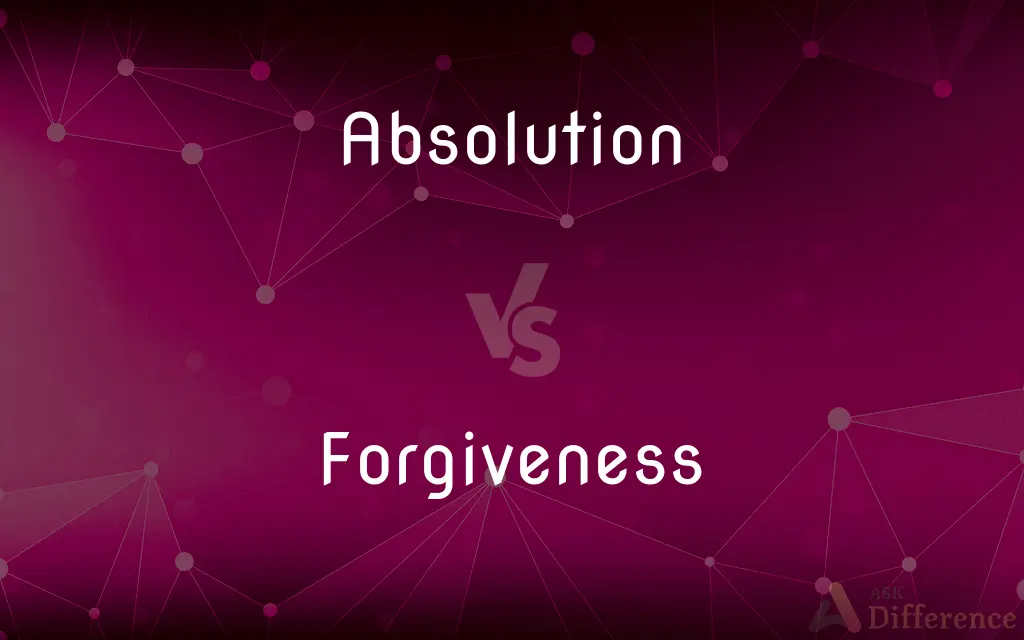Absolution vs. Forgiveness — What's the Difference?
Edited by Tayyaba Rehman — By Maham Liaqat — Updated on April 4, 2024
Absolution is a formal release from guilt, obligation, or punishment in a religious context, typically by a priest, while forgiveness is a personal act of letting go of resentment and negative feelings towards someone who has wronged you.

Difference Between Absolution and Forgiveness
Table of Contents
ADVERTISEMENT
Key Differences
Absolution, primarily found within various religious traditions, involves a formal declaration by an authority figure, such as a priest, that a person is relieved from the guilt of their sins. Forgiveness, on the other hand, does not require a formal process or authority figure and is a personal decision to release feelings of resentment or vengeance toward someone who has caused harm.
In the context of Christianity, absolution is a sacrament or ritual through which believers are forgiven their sins by God through the mediation of a priest. Forgiveness, however, is a moral and emotional process that can occur outside the boundaries of any religious framework, emphasizing personal peace and reconciliation.
Absolution often requires confession, repentance, and sometimes satisfaction, where the individual must confess their sins, show genuine remorse, and fulfill certain conditions to receive absolution. Forgiveness, however, can be granted without any conditions and does not necessarily involve an acknowledgment of guilt by the offender.
The granting of absolution is believed to have spiritual effects, such as reinstating the individual’s standing within their religious community and ensuring their soul’s salvation. Forgiveness, while it may also have spiritual benefits, primarily serves to improve psychological well-being and interpersonal relationships.
Both absolution and forgiveness can lead to reconciliation, but they approach it from different perspectives. Absolution focuses on reconciling the individual with the divine and the religious community, whereas forgiveness focuses on the personal and interpersonal aspects of reconciliation.
ADVERTISEMENT
Comparison Chart
Definition
Formal release from guilt by authority in religion
Personal act of letting go of resentment
Authority
Requires a religious authority, like a priest
No authority needed; personal decision
Process
Involves confession, repentance, satisfaction
Can occur without conditions or confession
Focus
Spiritual reconciliation and salvation
Psychological well-being and interpersonal peace
Requirements
Confession of sins, genuine remorse
May not require acknowledgment from offender
Outcome
Reinstates standing in religious community
Improves personal and interpersonal relationships
Spiritual Effect
Believed to affect one’s spiritual state and afterlife
Primarily affects this life’s emotional state
Framework
Religious
Moral and emotional
Compare with Definitions
Absolution
A formal release from guilt in a religious context.
In the confession, the priest granted him absolution for his sins.
Forgiveness
Letting go of resentment or vengeance.
Forgiveness can often lead to personal peace and reconciliation.
Absolution
Requires authority figures to administer.
Only a bishop or priest has the power to give absolution in the church.
Forgiveness
May or may not involve the offender.
She forgave him, even though he never apologized.
Absolution
Involves a ritual or sacrament in some religions.
Absolution is an important part of the sacrament of penance in Catholicism.
Forgiveness
Can improve relationships.
Their friendship grew stronger after forgiveness and understanding.
Absolution
Aimed at spiritual healing and salvation.
She sought absolution to ensure her soul’s peace.
Forgiveness
Personal, not requiring formal procedures.
He found it in his heart to forgive his friend without any conditions.
Absolution
Granted following specific conditions.
After completing his penance, he received absolution.
Forgiveness
Focuses on emotional and psychological well-being.
Forgiving her parents was a crucial step in her emotional healing.
Absolution
The forgiveness of sins, in a general sense.
Forgiveness
Forgiveness, in a psychological sense, is the intentional and voluntary process by which one who may initially feel victimized, undergoes a change in feelings and attitude regarding a given offense, and overcomes negative emotions such as resentment and vengeance (however justified it might be). Theorists differ, however, in the extent to which they believe forgiveness also implies replacing the negative emotions with positive attitudes (i.e.
Absolution
Absolution is a traditional theological term for the forgiveness imparted by ordained Christian priests and experienced by Christian penitents. It is a universal feature of the historic churches of Christendom, although the theology and the practice of absolution vary between denominations.
Forgiveness
The act of forgiving; pardon.
Absolution
The act of absolving or the state of being absolved.
Forgiveness
The action of forgiving.
He begged for forgiveness after being caught stealing from the shop.
Absolution
The formal remission of sin imparted by a priest, as in the sacrament of penance.
Forgiveness
Readiness to forgive.
Absolution
(ecclesiastical) An absolving of sins from ecclesiastical penalties by an authority.
Forgiveness
The act of forgiving; the state of being forgiven; as, the forgiveness of sin or of injuries.
To the Lord our God belong mercies and forgivenesses.
In whom we have . . . the forgiveness of sin.
Absolution
The form of words by which a penitent is absolved.
Forgiveness
Disposition to pardon; willingness to forgive.
If thou, Lord, shouldest mark iniquities, O Lord, who shall stand? But there is forgiveness with thee, that thou mayest be feared.
Absolution
An absolving, or setting free from guilt, sin, or penalty; forgiveness of an offense.
Governments granting absolution to the nation.
Forgiveness
Compassionate feelings that support a willingness to forgive
Absolution
An acquittal, or sentence of a judge declaring an accused person innocent.
Forgiveness
The act of excusing a mistake or offense
Absolution
(obsolete) Delivery, in speech.
Absolution
An absolving, or setting free from guilt, sin, or penalty; forgiveness of an offense.
Absolution
An acquittal, or sentence of a judge declaring and accused person innocent.
Absolution
The exercise of priestly jurisdiction in the sacrament of penance, by which Catholics believe the sins of the truly penitent are forgiven.
Absolution
An absolving from ecclesiastical penalties, - for example, excommunication.
Absolution
The form of words by which a penitent is absolved.
Absolution
Delivery, in speech.
Absolution
The condition of being formally forgiven by a priest in the sacrament of penance
Absolution
The act of absolving or remitting; formal redemption as pronounced by a priest in the sacrament of penance
Common Curiosities
Can one receive absolution without confession?
Generally, confession is a prerequisite for absolution in religions that practice it.
Is absolution the same as forgiveness?
No, absolution is a formal religious act, while forgiveness is a personal emotional process.
Can forgiveness happen without reconciliation?
Yes, one can forgive without reconciling, especially if the relationship is not safe or healthy.
Is forgiveness necessary for absolution?
Absolution often involves a form of forgiveness but is more about the removal of spiritual guilt.
Is it possible to forgive oneself?
Yes, self-forgiveness is an important aspect of emotional health and well-being.
Does absolution affect one's karma in religions like Hinduism or Buddhism?
Concepts similar to absolution in these religions may involve karma but are understood differently than in Abrahamic faiths.
Can forgiveness improve physical health?
Research suggests that forgiveness can lead to better mental and physical health outcomes.
How do different religions view absolution?
Absolution is viewed and practiced in various ways across different religions, with specific rituals and beliefs.
Are there any conditions where forgiveness is not advised?
In cases of ongoing abuse or harm, forgiveness might not be appropriate without significant changes and safety measures.
Can absolution be revoked?
Once granted, absolution is not typically revoked, but one might need to seek it again if they commit new offenses.
Is there a scientific basis for the benefits of forgiveness?
Yes, numerous studies have documented the psychological and physiological benefits of forgiveness.
Can absolution be granted outside of a religious context?
Absolution is specifically a religious act, so outside of religion, the term might not apply in the same way.
Is there a limit to forgiveness?
Limits to forgiveness are personal and can depend on the nature of the offense and the individual’s capacity to forgive.
How often can one receive absolution?
In religious practices, there are generally no limits to how often one can seek and receive absolution, as long as the prerequisites are met.
Does forgiveness require the offender to change?
Forgiveness is a personal decision and can occur regardless of the offender's actions or changes.
Share Your Discovery

Previous Comparison
Britches vs. Trousers
Next Comparison
Dogmatic vs. RigidAuthor Spotlight
Written by
Maham LiaqatEdited by
Tayyaba RehmanTayyaba Rehman is a distinguished writer, currently serving as a primary contributor to askdifference.com. As a researcher in semantics and etymology, Tayyaba's passion for the complexity of languages and their distinctions has found a perfect home on the platform. Tayyaba delves into the intricacies of language, distinguishing between commonly confused words and phrases, thereby providing clarity for readers worldwide.
















































